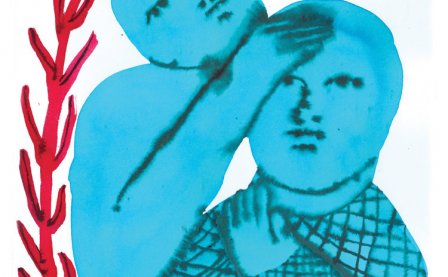Into The Grey Salons, Alice Cohen’s newest album, refers to “a series of rooms in an old dept store, which were called ‘the grey salons’ and were a series of little elegant rooms around the turn of the century, where ladies would try on hats, gowns etc.” Listeners are being invited into the various suites of this territory, guided within each track of the album, portraying a self-reflected, coming-of-age depiction of Cohen (as well as themselves, transposed), framed and unashamed — sort of like hitting that second wind, embracing self-swag in terms of whatever one’s mentality is telling them rather than something directly driven by society. But she only alludes to it. So while listeners are taking the venture “into the grey salons,” Cohen is merely observing a self-reflection of the characterizations within the vanity of each of these mirrored “little elegant rooms,” her image mustering a plethora of personalities, drawing a certain charm for each outfit/hat/vision that these suites adorn.
Cleverly beginning Into The Grey Salons with “Backwards,” Cohen toys with self-reflection and the past with lyrics involving echos, tattered ghosts, and faded photos, garnering this second-wind appeal of memories and developing a maturer, well-thought coming-of-age mentality. This is partly because of the potential of hope and good prompted by lines like “Stairways that hide behind the doorways that are locked in your mind,” which invite the listener into her thoughts on “checking in” on their contentment and personal aspiration, while also encouraging others to find gratitude in looking beyond memories and creating something new. This sentiment is followed up on “Looking Glass,” when she asks “Who you gonna be?” while playing the devil’s backbone of vanity with “revolving walls of identity,” which again reassures listeners that there are always other options than the one immediately at hand. It’s also important to note the pronoun change in third track “Deeper,” a fluctuation that points to the album’s mirroring effect: listeners are Alice Cohen, and she is the listeners. She also introduces a third figure, “baby,” a word that could refer to a number of relationships, including those of friendship, romance, parenthood, etc. It’s the space in her heart — the passion to figure out passion — that is being deconstructed here.
“Chinese Wash” is a ballad of sorts (featuring Autre Ne Veut, naturally), circling a piano and slide guitar that cook up a storm cloud of purity, as the lyrics beg, “A place to start over again.” Following the theme of self-reflection (potentially within grey salon mirrors), “Chinese Wash” beholds an interesting The Crying of Lot 49 motif — cut to: Oedipa crying behind glasses, fragmenting her vision of a Remedios Varo painting — where Cohen continues the “revolving walls of identity” theme, but within rain droplets, resulting in multiple reflections of identity. The coming-of-age approach stems from the maturity to self-reflect in a more neutral way, to find a peaceful balance between the negative and positive sides of a battling mentality. This is where the surrounding tracks of “Chinese Wash” gain increased weight, as “Monorail’s” brooding and chilly electronics act as emotional foreshadowing, while the piano, siren, bells, and echos of “The Apothecary” feel almost satirical. Then, with the that night vibe, “Twilight Fades” provides a sort of Dr. Jekyll & Mr. Hyde feel to these multiple personalities. Drifting downtown, streetlights and champagne, stepping in and out of shops and sidewalks, city dreaming — there’s a delusion to all of the confusion and surroundings, the melodious lyrical developments entrancing listeners with words and signifiers rather than through direct storytelling.
By the time “Fantasy” hits, the “candy-coated fantasy” feels more expressive in the physical sense. Here, the “fantasy” becomes a consciously-shaded “reflection” (or maybe more of a “portrayal”) that one casts without effort, using a shadow to represent the unavoidable nature of multiple personalities, neutralizing the effects of weighing too much upon a situation that would’ve happened eventually. The last two instrumental tracks are telling. “The Grey Salons” acts like a long car ride away from the department store, looking back while it’s still visible, maintaining that middle ground Cohen layers within herself and within her understanding of that same self. “Organ Grand Finale,” then, drifts in with a long organ crescendo, reprising Cohen’s coming-of-age momentum with a climax of youthful (and muffled) shouts of “Speech! Speech!” and deep, tonal organ vibrations. The track ends at the peak, Cohen in matrimony of understanding and self-acceptance.
More about: Alice Cohen




